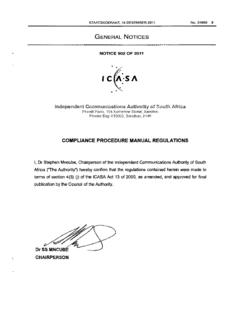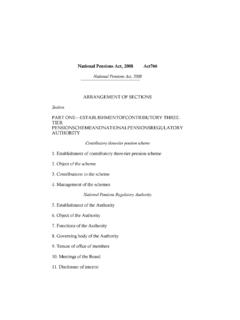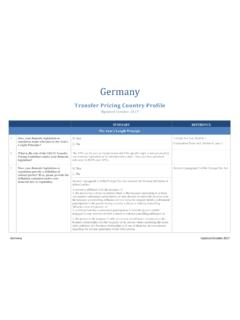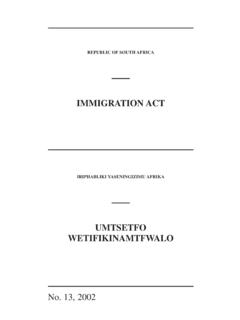Transcription of When is a financial product not a financial product?
1 (2004) 22 C&SLJ 103 103 When is a financial product not a financial product ? Dr Kevin Lewis* The definition of financial product is central to the operation of the financial services reforms in Ch 7 of the Corporations Act. In this article, the author explores the scope of that definition and critically examines recent rulings by ASIC that bills of exchange and promissory notes are not financial products for the purposes of Ch 7. He concludes that there is a strong likelihood that those rulings are not correct and outlines the consequences for industry participants if that is so. He suggests changes to the law to rectify the situation and action that ASIC and industry participants who advise on or deal in these products should be taking in the meantime to avoid a breach of the law.
2 INTRODUCTION The financial Services Reform Act1 (FSRA) was enacted in 2001 to address the deficiencies identified by the financial System Inquiry2 (FSI) with the regulatory regime for financial products and services. The FSI had found that regime to be: piecemeal and varied, and .. determined according to the particular industry and the product being provided. This was seen as inefficient, as giving rise to opportunities for regulatory arbitrage, and in some cases leading to regulatory overlap and In accordance with the FSI s recommendations, the FSRA inserted a new Ch 7 into the Corporations Act4 introducing a single licensing regime, and a consistent and comparable disclosure regime, for all financial To cater for emerging products without the need to enact amending legislation, the FSRA took a flexible three-part approach to defining financial products:6 a broad general definition focusing on the key functions performed by those products.
3 7 a list of specific inclusions8 and a regulation-making power to include further products;9 and a list of specific exclusions,10 coupled with a regulation-making power to exclude further products11 and a power for the Australian Securities and Investments Commission (ASIC) to declare products not to be financial * MBA (Sydney), SJD (Harvard), LLB (Hons) B Juris (Hons) (UWA). The author is the managing partner of Atanaskovic Hartnell and teaches a course in the LLM program at Sydney University Law School entitled Compliance: Theory and Practice in the financial Services Industry . 1 financial Services Reform Act 2001 (Cth). 2 financial System Inquiry Final Report, March 1997 (sometimes referred to as the Wallis Report).
4 The report is available online at: 3 Explanatory Memorandum, financial Services Reform Bill 2001 (Cth) (FSRA Explanatory Memorandum) at [ ]. The Explanatory Memorandum is available online at: 4 Unless otherwise stated, references to Chapters, Parts, divisions, subdivisions and sections of an Act are to the Corporations Act 2001 (Cth) (Corporations Act) and references to regulations are to the Corporations Regulations 2001 (Cth) (Corporations Regulations), in each case as amended and in force at the date of publication of this article. 5 FSRA Explanatory Memorandum, n 3 at [ ]. 6 FSRA Explanatory Memorandum, n 3 at [ ] and [ ]. See also Corporations Act s 762A. 7 Corporations Act s 763A(1).
5 8 Corporations Act s 764A(1). 9 Corporations Act s 764A(1)(m). Lewis 104 (2004) 22 C&SLJ 103 THE GENERAL DEFINITION OF financial product Section 763A(1) of the Corporations Act defines a financial product as a facility13 through which, or through the acquisition of which, a person: (a) makes a financial investment; (b) manages financial risk; or (c) makes non-cash payments. If a particular facility is of a kind through which people commonly do one of these things, it is a financial product even if it is acquired by a particular person for some other A facility that is a financial product when initially acquired retains that character when it is on-sold, regardless of the intention of the person buying For these purposes, a person (the investor) makes a financial investment if: (a) the investor gives money or money s worth (the contribution) to another person and any of the following apply: (i) the other person uses the contribution to generate a financial return or other benefit for the investor.
6 (ii) the investor intends that the other person will use the contribution to generate a financial return or other benefit for the investor (even if no return or benefit is in fact generated); (iii) the other person intends that the contribution will be used to generate a financial return or other benefit for the investor (even if no return or benefit is in fact generated); and (b) the investor has no day-to-day control over the use of the contribution to generate the return or 10 Corporations Act s 765A(1). 11 Corporations Act s 765A(1)(y). 12 Corporations Act s 765A(1)(z) and (2). 13 Facility is defined in s 762C. It includes: (a) intangible property; (b) an arrangement or a term of an arrangement (including a term that is implied by law or that is required by law to be included); or (c) a combination of intangible property and an arrangement or term of an arrangement.
7 Thus, a share is a financial product it is intangible property, and therefore a facility , through the acquisition of which a person makes a financial investment (see n 16 and accompanying text). 14 Corporations Act s 763A(2). 15 Corporations Act s 763A(3), which provides that a facility does not cease to be a financial product merely because it has been acquired by a person other than the person to whom it was originally issued and that person, in acquiring the product , was not making a financial investment or managing a financial risk. This particular provision is required because of the way in which making a financial investment is defined in s 763B (see n 16 and accompanying text).
8 That definition only caters for the initial acquisition of a financial product in the primary market and does not pick up subsequent purchases of a product in the secondary market. So while in the normal sense of the expression a person who buys a financial instrument in the secondary market by way of investment would be said to be making a financial investment , that will not be true for the purposes of Ch 7, given the particular meaning given to that phrase in s 763B. 16 Corporations Act s 763B. The notes to that section give as examples of making a financial investment: (a) a person paying money to a company for the issue to the person of shares in the company (the company uses the money to generate dividends for the person and the person, as a shareholder, does not have control over the day-to-day affairs of the company); and (b) a person contributing money to acquire interests in a registered scheme from the responsible entity of the scheme (the scheme uses the money to generate financial or other benefits for the person and the person, as a member of the scheme, does not have day-to-day control over the operation of the scheme).
9 Examples of actions that do not constitute making a financial investment are: (a) a person purchasing real property or bullion (while the property or bullion may generate a return for the person, it is not a return generated by the use of the purchase money by another person); or (b) a person giving money to a financial services licensee who is to use it to purchase shares for the person. In the latter case, the notes say that while the purchase of the shares will be a financial investment made by the person, the mere act of giving the money to the licensee will not of itself constitute making a financial investment. While the second part of this statement is correct, the first part is not necessarily correct.
10 Technically, the purchase of shares will only involve the making of a financial investment if it takes place by way of a subscription for new shares rather than a purchase of existing shares. If it is a purchase of existing shares, that will still be an acquisition of a financial product by virtue of s 763A(2) (see n 14 and accompanying text) and, more particularly, s 763A(3) (see n 15 and accompanying text), but it will not be the making of a financial investment as defined in s 763B. When is a financial product not a financial product ? (2004) 22 C&SLJ 103 105 A person manages financial risk if they manage the financial consequences to them of particular circumstances happening or avoid or limit the financial consequences of fluctuations in, or in the value of, receipts or costs (including prices and interest rates).






